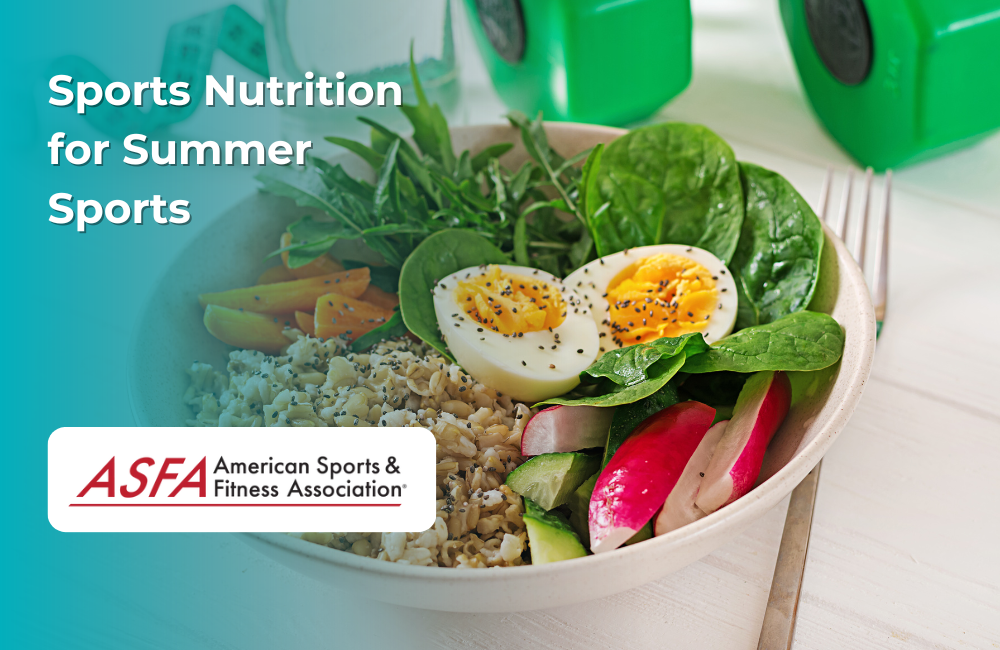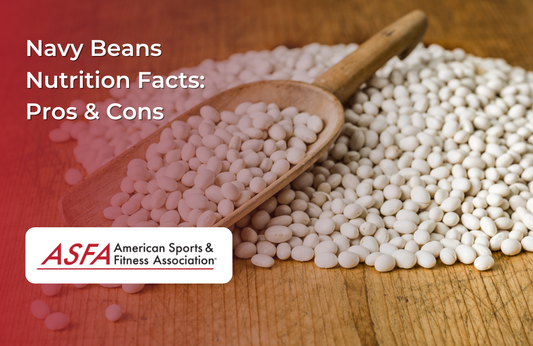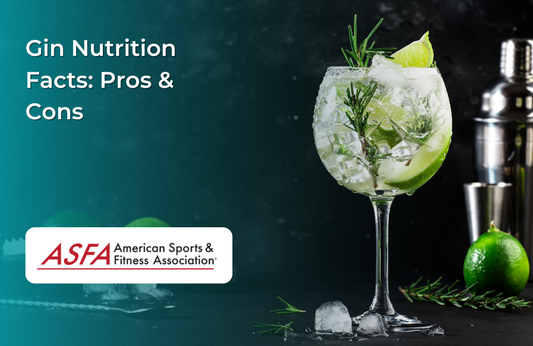Inflammation is a natural and essential response by the body’s immune system to protect against injury and infection. While acute inflammation helps in the healing process, chronic inflammation can lead to various health conditions and discomfort, including heart disease, diabetes, and autoimmune disorders. One of the most effective ways to control and reduce chronic inflammation is through diet. By incorporating anti-inflammatory foods and adopting healthy eating habits, you can promote a balanced inflammatory response and support overall well-being.
An athlete's age can significantly affect their nutritional needs and performance during intense summer activities. Tailored dietary strategies based on the athlete's development stage are crucial for optimal performance and recovery.
In this blog post, we will explore the fastest ways to reduce inflammation with diet, drawing insights from the American Sports and Fitness Association (ASFA).
Preparing for Intense Summer Sport Days
Preparing for intense summer sport days requires a combination of proper nutrition, hydration, and training. As a youth athlete, it’s essential to fuel your body with the right foods to ensure peak performance. A big and balanced meal the night before a long training session or competition is crucial to replenish muscle glycogen and provide energy for the next day. Include complex carbohydrates, lean protein, and healthy fats in your meal to support athletic performance.
In addition to nutrition, hydration is also critical for intense summer sport days. Aim to drink at least 8-10 glasses of water per day, and make sure to drink sports drinks during long training sessions or competitions to replenish electrolytes. Electrolytes, such as sodium and potassium, play a crucial role in maintaining proper hydration and preventing dehydration.
Understanding Inflammation
1. Acute vs. Chronic Inflammation:
-
Acute Inflammation: This is the body's short-term response to injury or infection, characterized by redness, swelling, and pain. It's necessary for healing and typically resolves once the body has dealt with the issue.
-
Chronic Inflammation: Unlike acute inflammation, chronic inflammation is long-lasting and can contribute to various diseases such as arthritis, cardiovascular disease, and certain cancers. It results from prolonged exposure to irritants, infections, or an unhealthy lifestyle, and diet plays a significant role in either promoting or reducing chronic inflammation.
2. The Role of Diet in Inflammation:
The food you consume can either fuel or fight inflammation. A diet high in processed foods, refined sugars, unhealthy fats, and excessive alcohol can exacerbate inflammation, while an anti-inflammatory diet rich in whole, nutrient-dense foods can help reduce inflammation and support your overall health.
Fastest Ways to Reduce Inflammation with Diet
1. Emphasize Anti-Inflammatory Foods:
Incorporating a wide variety of anti-inflammatory foods is one of the most effective ways to reduce inflammation quickly. These include:
-
Fruits and Vegetables: Leafy greens, berries, tomatoes, and broccoli are packed with antioxidants and polyphenols, which help combat inflammation.
-
Fatty Fish: Rich in omega-3 fatty acids, fish like salmon, sardines, and mackerel can significantly reduce inflammation.
-
Nuts and Seeds: Almonds, walnuts, chia seeds, and flaxseeds are high in healthy fats and antioxidants.
-
Whole Grains: Brown rice, quinoa, and oats provide fiber and nutrients that reduce inflammation.
-
Legumes: Beans, lentils, and chickpeas are great sources of fiber and protein that support a healthy inflammatory response.
Youth athletes, especially those involved in two-a-day practices, need to focus on their nutrition and hydration to meet the demands of these intense training sessions. Proper fueling and hydration are essential to prevent negative health effects and maintain performance.
2. Opt for Healthy Fats:
Healthy fats, particularly those with anti-inflammatory properties, play a critical role in reducing inflammation. Professional athletes utilize healthy fats in their nutritional strategies to impact performance and recovery. Include:
-
Avocados: High in monounsaturated fats and antioxidants that help reduce inflammation.
-
Olive Oil: Extra virgin olive oil contains oleocanthal, which has anti-inflammatory effects similar to ibuprofen.
-
Coconut Oil: Though debated, coconut oil has been shown to have anti-inflammatory properties due to its medium-chain fatty acids.
-
Nuts and Seeds: These contain essential fatty acids that help modulate inflammation.
3. Reduce Processed and Refined Foods:
One of the fastest ways to reduce inflammation is to eliminate or limit processed foods, which are often loaded with unhealthy fats, added sugars, and artificial additives. These foods can lead to an imbalance in the body’s inflammatory response. Proper nutrition the night before a long summer training session is crucial for optimal performance, as it ensures athletes are well-fueled and hydrated to handle the physical demands of strenuous summer activities.
-
Processed Meats: Minimize consumption of hot dogs, sausages, and bacon, which contain high levels of sodium and unhealthy fats.
-
Refined Carbohydrates: White bread, pastries, and sugary cereals can trigger inflammatory responses due to their high glycemic index.
4. Limit Added Sugars:
Excessive sugar intake can lead to chronic inflammation. High-sugar diets increase the production of pro-inflammatory cytokines in the body, contributing to inflammation. During the summer months, it is especially important to consume hydrating fruits and vegetables to maintain energy and performance levels.
-
Sugary Beverages: Soda, energy drinks, and sweetened juices should be replaced with water, herbal teas, or green tea.
-
Natural Sweeteners: Use alternatives like honey, maple syrup, or stevia in moderation to satisfy your sweet tooth without triggering inflammation.
5. Increase Fiber Intake:
A fiber-rich diet can significantly reduce inflammation by promoting a healthy gut microbiome, which plays a crucial role in immune regulation. Additionally, a fiber-rich diet is essential for keeping youth athletes fueled during high-activity days in the summer, ensuring they maintain energy levels and perform at their best.
-
Whole Grains and Legumes: Oats, brown rice, beans, and lentils are excellent sources of dietary fiber.
-
Fruits and Vegetables: High-fiber fruits and vegetables, such as apples, pears, carrots, and leafy greens, are also beneficial for reducing inflammation.
6. Spice Up Your Meals:
Certain herbs and spices are potent anti-inflammatories and can be easily added to your meals for flavor and health benefits. Additionally, playing sports can significantly enhance children's physical fitness and teach them important safety measures, contributing to their overall development.
-
Turmeric: Contains curcumin, a powerful anti-inflammatory compound. Adding turmeric to soups, stews, and smoothies can help lower inflammation.
-
Ginger: Known for its anti-inflammatory and antioxidant effects, ginger can be used in teas, smoothies, and stir-fries.
-
Garlic: A natural anti-inflammatory, garlic is best used fresh in a variety of dishes.
-
Cinnamon and Cloves: These spices contain antioxidants that help fight inflammation.
7. Stay Hydrated:
Staying properly hydrated is vital for overall health, including the body's inflammatory response. Water helps flush out toxins, transport nutrients, and maintain cellular health.
-
Water: Drink adequate water throughout the day, aiming for at least 8 glasses. Hydration supports optimal bodily functions and keeps inflammation in check.
-
Herbal Teas: Ginger, turmeric, or chamomile teas can also support hydration while offering additional anti-inflammatory benefits.
Hydration and Electrolytes
Proper hydration is essential for athletic performance, especially during intense summer sport days. Dehydration can lead to decreased performance, fatigue, and even serious health issues. As a youth athlete, it’s essential to drink plenty of water throughout the day, and to consume sports drinks during long training sessions or competitions.
Staying Hydrated Through Fruits and Veggies
Fruits and vegetables are not only nutritious but also hydrating. Include foods high in water content, such as watermelon, cantaloupe, and honeydew, in your diet to help replenish fluids. Other hydrating foods include strawberries, grapes, and pineapple, as well as vegetables like cucumber and zucchini. Aim to consume at least 5 servings of fruits and vegetables per day to support hydration and overall health.
The Role of Sodium and Electrolytes
Sodium and electrolytes play a crucial role in maintaining proper hydration and preventing dehydration. Sodium helps regulate the amount of water in the body, while electrolytes, such as potassium and magnesium, help regulate muscle and nerve function. As a youth athlete, it’s essential to consume sports drinks that contain sodium and electrolytes during long training sessions or competitions to replenish lost electrolytes and prevent dehydration.
Fueling for Long Summer Training Sessions
Fueling for long summer training sessions requires a combination of proper nutrition and hydration. As a youth athlete, it’s essential to consume a balanced diet that includes complex carbohydrates, lean protein, and healthy fats to support athletic performance.
Carbohydrates for Energy
Carbohydrates are the body’s primary source of energy, and are essential for fueling long summer training sessions. Include complex carbohydrates, such as whole grains, fruits, and vegetables, in your diet to provide sustained energy. Aim to consume 2-3 grams of carbohydrates per kilogram of body weight per day to support athletic performance.
In addition to complex carbohydrates, simple carbohydrates, such as sports drinks and energy gels, can provide quick energy during long training sessions. However, be sure to consume these in moderation, as excessive sugar intake can lead to decreased performance and digestive issues.
By following these tips, youth athletes can ensure they are properly fueled and hydrated for intense summer sport days and long summer training sessions. Remember to always consult with a healthcare professional or registered dietitian for personalized nutrition advice.
ASFA's Insights on Reducing Inflammation with Diet for Athletic Performance
The American Sports and Fitness Association (ASFA) offers valuable insights into how diet can be used to reduce inflammation and support health:
Individualized Approach for Youth Athletes:
Every individual is different, and what works for one person may not work for another. Factors such as medical conditions, lifestyle, and genetic predispositions can affect how a person responds to certain foods. Consulting with a healthcare professional or registered dietitian is recommended to develop a diet plan tailored to your needs.
2. Balanced Nutrition:
While focusing on anti-inflammatory foods is crucial, ASFA highlights the importance of balanced nutrition. This includes not only consuming anti-inflammatory foods but also ensuring you're getting enough macronutrients (carbohydrates, proteins, and fats) and micronutrients (vitamins and minerals) to support your body's overall health.
Holistic Lifestyle Factors for Professional Athletes:
In addition to diet, the importance of other lifestyle factors in reducing inflammation, such as:
-
Stress Management: Chronic stress can trigger inflammation, so finding ways to manage stress through mindfulness, meditation, or physical activity is important.
-
Regular Physical Activity: Exercise can help reduce inflammation, especially when combined with proper nutrition.
-
Sleep Quality: Lack of sleep has been linked to increased inflammation, so ensuring adequate rest is essential for managing inflammation.
Conclusion
Reducing inflammation with diet is a comprehensive approach that involves incorporating anti-inflammatory foods, avoiding pro-inflammatory foods, and adopting healthy lifestyle habits. The American Sports and Fitness Association (ASFA) provides practical insights into how making mindful dietary changes can help promote a balanced inflammatory response.
Whether you're dealing with chronic inflammation or simply want to maintain good health, the key is to be consistent in your approach, choose nutrient-dense foods, and consider your individual needs. For optimal results, consult with a registered dietitian or healthcare professional to tailor your dietary strategy to your specific health goals and conditions. Through smart food choices and mindful living, you can reduce inflammation and support long-term health and well-being.





